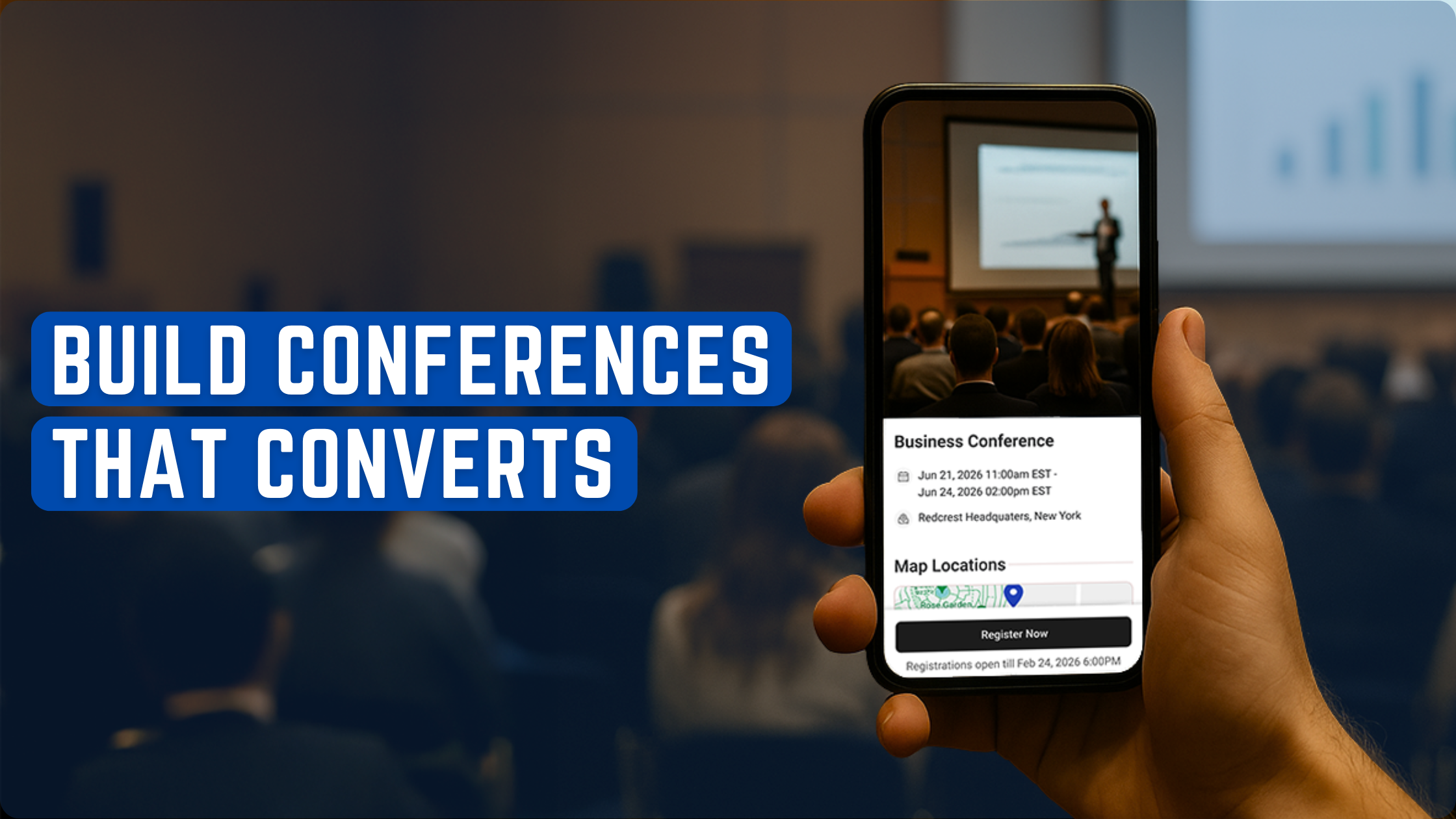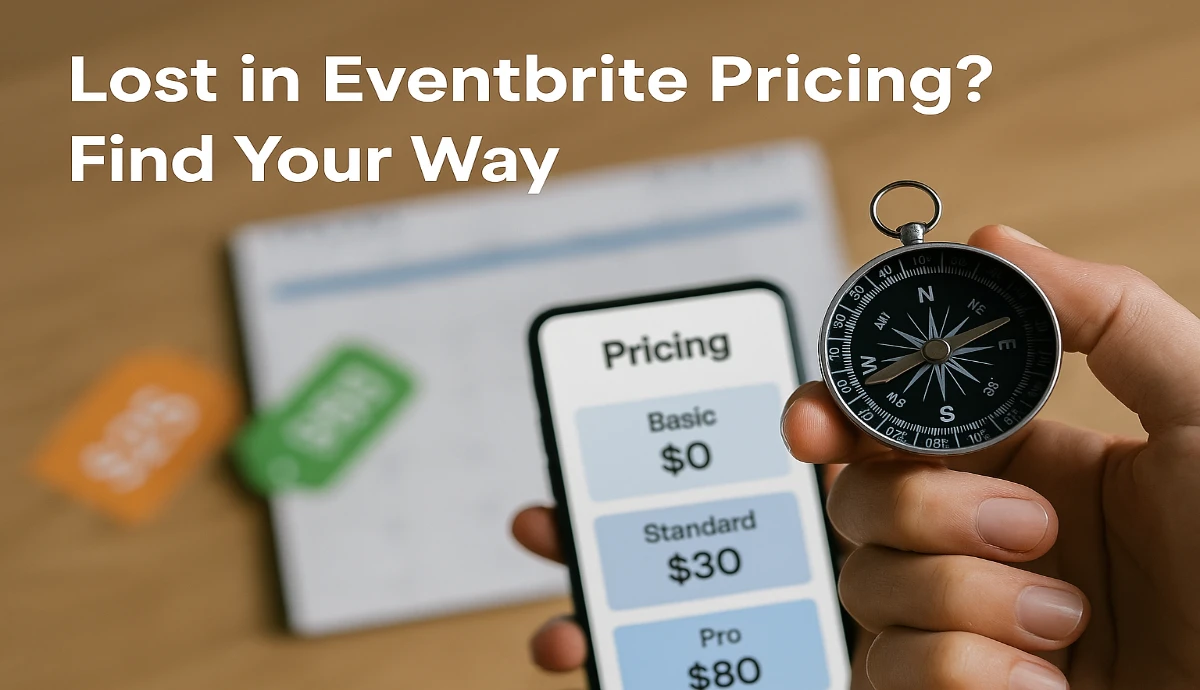The demand for AI tools for event management is higher than ever before. This is because of the rapidly evolving and highly competitive event landscape where organizers are continuously exploring innovative strategies to captivate their target audience.
Artificial intelligence (AI) has revolutionized the way we plan, organize, and experience online events. From task automation to real-time assistance, AI ensures every work is quick and efficient.
We’ve compiled a list of effective AI tools for event management from a broad range of categories to help you plan your next events better.
A. Popular AI tools for event management
Here is the list of the most popular tools under different categories:
1. Ticket generation tools
Ticket generation tools help event planners streamline various aspects of their events, including registration, ticketing, and post-event analytics. These AI tools for event management utilize AI technologies to automate repetitive tasks, personalize attendee experiences, and optimize workflow events.
In this list, one outstanding tool takes the day:
i.Ticket Generator
Ticket Generator is an all-in-one event management platform that allows users to create single-use event tickets and validate them via smartphones. Event organizers can effortlessly design, generate, and distribute event tickets in minutes without investing in any expensive design software. The tickets are secured with QR Code technology, which prevents invalid or duplicate tickets from being stolen by unauthorized guests.
Key Features
- Customize tickets with your choice of text, font, and colors. Users can upload brand logos and images and edit essential event details like event name, description, venue, date, timings, etc
- Users can create fully mobile-optimized landing pages. The registration tool is simple and intuitive, allowing users to customize landing pages by adding details like description boxes, banner images, register buttons, and form fields
- Each ticket comes with a unique QR Code containing essential ticket information and encryption that scanning devices can decode
- Get attendee analytics to review your event and plan better for the future. Users can analyze data like the event’s time and duration, the total number of attendees, the count of valid, invalid, and duplicate tickets, tickets validated per coordinator, and more
- Generate multiple tickets which users can easily download as PDFs and send them directly to the attendees via Email, Phone, WhatsApp
2. Virtual event platforms
The use of virtual event platforms accelerated during the COVID-19 pandemic and continues to be prominent. These platforms allow organizations to host fully virtual or hybrid events, including conferences, webinars, and networking events using live streaming, video conferencing, and other interactive features.
In our list, virtual event platforms are rightly represented by the two most popular choices:
i.Zoom
Zoom is a notable virtual event platform primarily known for video conferencing with a multitude of features such as event registration, live streaming, and breakout rooms. It also offers AI-driven transcription and translation services to enhance accessibility for diverse audiences.
Top features:
- Organizers can host live events, webinars, and meetings with video, audio, and screen-sharing capabilities. The capacity is up to thousands of participants
- The host can divide the attendees into smaller groups for discussions, workshops, or networking sessions using breakout rooms
- Organizers can conduct live polls, surveys, and Q&A sessions during virtual events, promoting engagement and interaction among participants
- Users can utilize AI-driven transcription and translation services along with closed captioning options to make the content accessible to diverse audiences
ii. Hopin
Hopin is another popular virtual event platform that enables organizers to host online events, webinars, and conferences. The platform is AI-powered to facilitate meaningful connections among attendees, helping organizers deliver seamless and impactful virtual events.
Top features:
- Offers customizable virtual event spaces for organizers to host various sessions, booths, and networking areas for an exciting experience
- Hosts can stream live keynote presentations, panel discussions, and other important event sessions, allowing participants worldwide to watch and participate in real-time
- With AI-powered match-making algorithms, attendees can connect to people with similar interests and backgrounds, paving the way for meaningful connections
- It offers interactive features such as live polls, Q&A sessions, and virtual breakout rooms, allowing participants to interact and engage with each other
- Offers detailed analytics and insights on attendee engagement, session attendance, and overall event performance. This helps to measure the success of events and make data-driven decisions
3. Venue sourcing tools
The key role of venue-sourcing tools is to help event organizers find suitable venues for their events. This is done by offering a database of venues with real-time availability and AI-powered recommendations based on specific criteria and preferences. These tools are great for streamlining the venue selection process and saving planners time and effort in ensuring they find the perfect event space.
We’re discussing two of the leading venue-sourcing AI tools for event management:
i. Bizly
Bizy is an efficient venue-sourcing AI platform that simplifies the process of finding and booking the perfect venue for meetings, conferences, and events. It offers an intuitive interface for organizers to search, compare, and book venues with ease. Users get a curated selection of venues based on specific requirements such as location, capacity, and budget.
Top features:
- Organizers can choose from a list of venues for any type of event, including meetings, conferences, trade shows, etc., with detailed information on capacity, amenities, and pricing
- Users get to know real-time availability and booking options for venues, allowing them to secure their preferred dates and times
- Offers a personalized experience for users with tailored recommendations, search filters, and intuitive booking tools
- Allows organizers to collaborate with stakeholders such as colleagues, clients, and vendors during the venue selection process with built-in communication and sharing tools
ii. Social Tables
Social Tables is an event diagramming and seating arrangement tool with a user-friendly interface and powerful features. Organizers can create customized event floor layouts, floor plans, and seating arrangements with a drag-and-drop functionality. Social Tables allow users to visualize event spaces, optimize seating arrangements, and create an unforgettable experience for attendees.
Top features:
- Allows organizers to visualize venue layout while creating interactive floor plans and seating arrangements for their events
- Offers AI-powered recommendations based on locations, capacity, and event type
- Organizers can explore the venues remotely with 3D walkthroughs of event spaces to get an idea of the layout, ambiance, and amenities
- Organizers can collaborate with clients, vendors, and other stakeholders during the venue selection process with shared notes, comments, and updates
- Offers integration with other event management tools to streamline the venue selection and booking process
4. Event marketing and promotion tools
Organizers can utilize event marketing and promotion tools to create buzz, generate interest, and drive event attendance. Users can create targeted, personalized communication and promotion strategies while optimizing marketing efforts and measuring campaign effectiveness in real-time.
Here are two of the prominent event marketing and promotion tools:
i. Bizzabo
Bizzabo enables organizers to create, manage, and promote events by creating integrated marketing campaigns across multiple channels, including email, social media, and digital advertising.
Top features:
- Allows organizers to create customized event websites with features such as agenda scheduling, speaker profiles, and registration forms
- Organizers can promote their events by creating personalized email marketing campaigns with facilities for segmentation, automation, and A/B testing
- Bizzabo also offers tools for promoting events on social media platforms and sharing, tracking, and analyzing social media activity
- Users get real-time analytics on event website traffic, email campaign performance, and social media engagement with insights into attendee behavior and preferences
ii. Hubilo
Hubilo is designed to enhance the attendee experience and drive meaningful connections at virtual, hybrid, and in-person events. Its dynamic and robust features allow users to create event websites, personalized agendas, and engaging networking opportunities.
Top features:
- Organizers can create event websites with features such as agenda scheduling, sponsor showcase, and attendee networking profiles
- Allows organizers to create and send targeted email campaigns with features for personalization, segmentation, and tracking
- Offers AI-driven attendee matchmaking and networking tools to pave the way for connections and interactions among attendees
- Offers real-time analytics on event registration, attendee engagement, and session popularity
5. Event chatbots and assistants
Event chatbots and assistants are AI-powered tools that help organizers elevate the event experience and streamline event communication. They serve as virtual assistants, providing real-time support to attendee inquiries before, during, and after the event. They can also offer scheduled updates and assist with registration and logistics.
Here are some of the most notable event chatbots:
i. EventBots by Science
EventBots are designed to assist stakeholders with event-related queries, provide scheduled updates and session recommendations, and even help gather feedback.
Top features:
- Offers real-time assistance with event-related queries, FAQs and more
- Can gather feedback via text or voice commands, with features for accessing event agendas, speaker bios, and venue details
- Provides personalized recommendations and assistance tailored to each attendee’s needs and preferences
ii. Grip
Grip is an innovative AI-powered event platform where both participants can make better relationships by networking. It suggests relevant networking opportunities by analyzing attendee profiles and preferences. Grip allows participants to schedule one-on-one meetings and explore interactive sessions tailored to their interests.
Top features:
- Grip utilizes matchmaking algorithms to connect people with similar interests and facilitate meaningful networking opportunities
- Participants can make meaningful connections based on their preferences and networking objectives
- Participants and businesses can exchange virtual business cards, contact information, and LinkedIn profiles within the platform
6. AI content creation tools for events
Content creation tools can help organizers develop impactful content to promote, enhance, and document their events. From brainstorming ideas and designing event flyers to creating promotional video materials, these tools offer users the resources and capabilities to create compelling content for event promotion and marketing.
Here are two most popular tools you can use in content creation:
i. ChatGPT
ChatGPT is a natural processing tool that is ideal for finding ideas and inspiration. All you have to do is give a prompt, and it will structure ideas accordingly. The best ways to utilize it are to research ideas, schedule events, and generate event ideas by giving prompts.
Top Features
- Offers brainstorming sessions for event ideas
- Facilitates creation of compelling event descriptions by summarizing key details such as event theme, agenda, speakers, and activities
- Helps craft social media posts to promote events across multiple platforms like Facebook, Instagram, and Linkedin using relevant hashtags and visuals
- Assists in editing and proofreading content for accuracy, clarity, and consistency to ensure professionalism
ii. Lumen5
Lumen5 is an intuitive drag-and-drop video platform that can assist you in making a presentation slideshow or promotional video. Its AI-driven feature can automatically convert blogs into videos, saving a lot of your time so you can focus on other creative projects.
Top features:
- Offers hundreds of templates that users can utilize to create captivating promotional materials
- Ability to convert written text into engaging videos
- Offers access to licensed images and videos from Unsplash and Shutterstock
B. Supercharge your events with Ticket Generator
Our comprehensive list of AI tools for event management is sure to help you look after every aspect of your event. With technology advancing every day, utilizing AI technologies is the smartest, quickest, and most effective way to manage events.
If you want to streamline your entire event management and registration process, try out Ticket Generator. It’s intuitive, easy to use, and available 24/7.






.gif)






